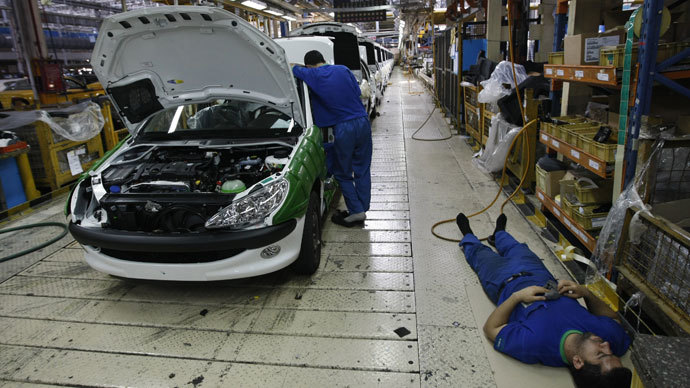European companies likely to be losers in US-Iran rapprochement

If the sanctions against Iran are lifted, the Iranians will look mainly towards American firms in the oil and automobile sector to fill the gap, George Malbrunot, a journalist for French newspaper Le Figaro, told RT.
RT:Both Iran and the US are signaling a thaw in their
political relations – what effect will it this have on economic
ties and business? Does it look like the US is attempting to
force out other companies from the Iranian market?
George Malbrunot: I think already there have been some secret
contacts between US firms and Iranian counterparts in order to
prepare, to anticipate the political deal between Iran and the
United States. Mainly these contacts have occurred in the
automobile sector. For the last year or more there have been some
emissaries from General Motors, for example, going to Tehran to
see their Iranian counterparts from Iran Khodro, in order to
prepare the ground for the [return] of General Motors to Iran,
which was very important before 1979.
So there are these kind of contacts with not only GM but other
big US companies, also in the oil and gas sectors, which are very
important in Iran, and it has been encouraged recently by the
executive order that Barack Obama signed on June, 3, which
prevents subcontractors dealing with Iranian firms in the
automobile sector. And in fact this executive order was deeply
targeting the French who are the only one now in the automobile
sector in Iran, especially Renault, and the French contractors
are very upset about that. And they interpret it as an attempt to
clean the Iranian market before the return of US companies in
Iran.

RT:In your article, you say American companies are
securing their positions on the Iranian market – how is this
happening?
GM: For the last six months, we've heard from Iran’s
supreme leader, Ayatollah Khomenei, that we are not any more
opposed to direct contacts with the US. The businessmen are
always more active in anticipating political deals and to
anticipate change. During all these years of bad relations
between Iran and the US there have always been some kind of
secret contacts between US firms and Iranian firms. And mainly
these contacts have been accelerated after the election of
President Rouhani in Iran. And we've all seen at the last UN
General Assembly in New York last month that now the Iranians are
talking to the Americans. So there are preparations on the ground
in order to go to Iran which is a huge market, 80 million
consumers, with huge oil and gas resources, so it's natural that
US businessmen are watching very carefully the developments which
happen between Iran and the US.
And not only US businessmen are very [eager] to go to Iran, but
you have also the German businessmen, who have always been
active, with Siemens for example, and even the British who have
no diplomatic relations with Iran are now starting to [study]
this market carefully. The Japanese are also very active. And
unfortunately for us in France, we are perhaps the last in Europe
to try to go to Iran, because for the last [few] years France was
extremely active in fighting against Iran. France was exerting
the pressure on Iran in order to implement the sanctions. So the
French businessmen are very upset with what's going on now,
because for the last 20 years the US was [not in] Iran, and
French businessmen had quite a good position in Iran - Total,
Peugeot, Renault - and now they are afraid that all these years
of efforts will be [wiped away] by the new deal which will happen
between the US and Iran.
RT:Do you think we will be seeing an easing of
sanctions against Iran soon?
GM: I think so, and the Iranians are a very proud nation
and they have been always having very strange relations with
Americans, love and hate, and once the sanctions will be lifted
I'm quite sure the Iranians will look mainly toward American
firms in the oil sector, in the automobile sector to fill the
gap. So for sure European companies will be more probably losers
in this kind of agreement.
I think that GM and even Chevrolet will go extremely quickly to
Iran if there is a political agreement between the US and Iran,
if the sanctions are lifted. I'm not sure that the Iranians will
give a lot of pieces of the cake to French companies or others on
this issue. And this is the reason why French companies are very
worried about what's going on in the shadow of this rapprochement
between the US and Iran.
The statements, views and opinions expressed in this column are solely those of the author and do not necessarily represent those of RT.












